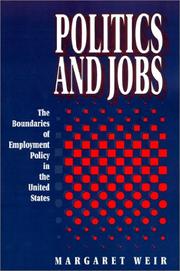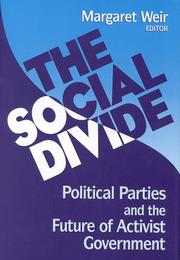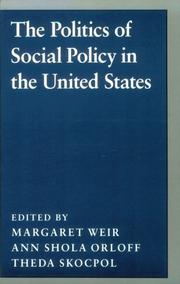| Listing 1 - 10 of 17 | << page >> |
Sort by
|

ISBN: 069107853X 0691024928 0691227853 Year: 1992 Publisher: Princeton (N.J.) : Princeton university press,
Abstract | Keywords | Export | Availability | Bookmark
 Loading...
Loading...Choose an application
- Reference Manager
- EndNote
- RefWorks (Direct export to RefWorks)
"Americans claim a strong attachment to the work ethic and regularly profess support for government policies to promote employment. Why, then, have employment policies gained only a tenuous foothold in the United States? To answer this question, Margaret Weir highlights two related elements: the power of ideas in policymaking and the politics of interest formation. Rather than seeing policy as a straightforward outcome of public preferences, she shows how ideas frame the problems and how interests form around possibilities created by the interplay of ideas and politics." "By examining Keynesian macroeconomic policy in the 1930s and 1940s, labor market policies in the 1960s and 1970s, and efforts to develop new planning mechanisms in the late 1970s, Weir shows how early decisions restricted the scope for later initiatives. As a result, policies in the 1960s emphasized racial differences and thus drew opposition for creating special interest measures for African-Americans. Highlighting the limited capacities of the American national state, employment policy also attracted charges of waste, fraud, and corruption. By the 1970s, antipathy to the federal government and racial antagonism dominated the politics in this field, and any ideas for new programs quickly became entangled with preexisting problems."--Jacket
Labour market --- United States --- Politique de plein emploi --- Création d'emplois (Programmes gouvernementaux) --- Création d'emplois (Programmes gouvernementaux) --- Full employment policies --- Manpower policy --- Public service employment --- Emploi --- Politique gouvernementale --- Public service employment. --- Manpower policy. --- Full employment policies. --- Marche du travail --- Plein emploi --- Creation d'emplois --- United States. --- États-Unis --- Politique sociale. --- Activism. --- Adam Przeworski. --- Adviser. --- Advocacy group. --- Affirmative action. --- Alvin Hansen. --- American Economic Association. --- Americans. --- Apprenticeship. --- Black capitalism. --- Bureaucracy. --- Civil Works Administration. --- Civil service. --- Congressional Quarterly. --- Council of Economic Advisers. --- Daniel Patrick Moynihan. --- Demand For Labor. --- Domestic policy. --- E. Wight Bakke. --- Economic Report of the President. --- Economic interventionism. --- Economic planning. --- Economic policy. --- Economic problem. --- Economics. --- Economist. --- Employment agency. --- Employment. --- Equal opportunity. --- Executive agency. --- Fiscal policy. --- Foray. --- Full employment. --- Funding. --- Government spending. --- Government. --- Hostility. --- Human resources. --- Incentive program. --- Individualism. --- Institution. --- Jimmy Carter. --- Keynesian economics. --- Labour supply. --- Legislation. --- Lobbying. --- Lyndon B. Johnson. --- Macroeconomics. --- Milton Friedman. --- National Policy. --- Natural rate of unemployment. --- Obstacle. --- Office of Economic Opportunity. --- Office of Management and Budget. --- Policy Network. --- Policy. --- Political alliance. --- Political economy. --- Political party. --- Political science. --- Political strategy. --- Political system. --- Politician. --- Politics. --- Private sector. --- Program evaluation. --- Public interest. --- Public opinion. --- Public philosophy. --- Public policy. --- Public sphere. --- Ray Marshall. --- Richard Cloward. --- Richard Nathan. --- Richard Nixon. --- Social movement. --- Social policy. --- Supply-side economics. --- Tax cut. --- Tax policy. --- Tax reform. --- Tax. --- Theda Skocpol. --- Trade union. --- Trade-off. --- Underclass. --- Unemployment benefits. --- Unemployment. --- United States Department of Labor. --- Urban Institute. --- Voting. --- Walter Heller. --- War on Poverty. --- Welfare state. --- Welfare. --- Work ethic. --- Workfare. --- Workforce. --- Works Progress Administration. --- World War II. --- Economic policy --- Employment stabilization --- Unemployment --- Employment policy --- Human resource development --- Labor market --- Labor market policy --- Manpower utilization --- Labor policy --- Labor supply --- Trade adjustment assistance --- Employment, Public service --- Work relief --- Economic assistance, Domestic --- Civil service --- Government policy --- ABŞ --- ABSh --- Ameerika Ühendriigid --- America (Republic) --- Amerika Birlăshmish Shtatlary --- Amerika Birlăşmi Ştatları --- Amerika Birlăşmiş Ştatları --- Amerika ka Kelenyalen Jamanaw --- Amerika Qūrama Shtattary --- Amerika Qŭshma Shtatlari --- Amerika Qushma Shtattary --- Amerika (Republic) --- Amerikai Egyesült Államok --- Amerikanʹ Veĭtʹsėndi︠a︡vks Shtattnė --- Amerikări Pĕrleshu̇llĕ Shtatsem --- Amerikas Forenede Stater --- Amerikayi Miatsʻyal Nahangner --- Ameriketako Estatu Batuak --- Amirika Carékat --- AQSh --- Ar. ha-B. --- Arhab --- Artsot ha-Berit --- Artzois Ha'bris --- Bí-kok --- Ē.P.A. --- EE.UU. --- Egyesült Államok --- ĒPA --- Estados Unidos --- Estados Unidos da América do Norte --- Estados Unidos de América --- Estaos Xuníos --- Estaos Xuníos d'América --- Estatos Unitos --- Estatos Unitos d'America --- Estats Units d'Amèrica --- Ètats-Unis d'Amèrica --- États-Unis d'Amérique --- Fareyniḳṭe Shṭaṭn --- Feriene Steaten --- Feriene Steaten fan Amearika --- Forente stater --- FS --- Hēnomenai Politeiai Amerikēs --- Hēnōmenes Politeies tēs Amerikēs --- Hiwsisayin Amerikayi Miatsʻeal Tērutʻiwnkʻ --- Istadus Unidus --- Jungtinės Amerikos valstybės --- Mei guo --- Mei-kuo --- Meiguo --- Mî-koet --- Miatsʻyal Nahangner --- Miguk --- Na Stàitean Aonaichte --- NSA --- S.U.A. --- SAD --- Saharat ʻAmērikā --- SASht --- Severo-Amerikanskie Shtaty --- Severo-Amerikanskie Soedinennye Shtaty --- Si︠e︡vero-Amerikanskīe Soedinennye Shtaty --- Sjedinjene Američke Države --- Soedinennye Shtaty Ameriki --- Soedinennye Shtaty Severnoĭ Ameriki --- Soedinennye Shtaty Si︠e︡vernoĭ Ameriki --- Spojené obce severoamerické --- Spojené staty americké --- SShA --- Stadoù-Unanet Amerika --- Stáit Aontaithe Mheiriceá --- Stany Zjednoczone --- Stati Uniti --- Stati Uniti d'America --- Stâts Unîts --- Stâts Unîts di Americhe --- Steatyn Unnaneysit --- Steatyn Unnaneysit America --- SUA (Stati Uniti d'America) --- Sŭedineni amerikanski shtati --- Sŭedinenite shtati --- Tetã peteĩ reko Amérikagua --- U.S. --- U.S.A. --- United States of America --- Unol Daleithiau --- Unol Daleithiau America --- Unuiĝintaj Ŝtatoj de Ameriko --- US --- USA --- Usono --- Vaeinigte Staatn --- Vaeinigte Staatn vo Amerika --- Vereinigte Staaten --- Vereinigte Staaten von Amerika --- Verenigde State van Amerika --- Verenigde Staten --- VS --- VSA --- Wááshindoon Bikéyah Ałhidadiidzooígíí --- Wilāyāt al-Muttaḥidah --- Wilāyāt al-Muttaḥidah al-Amirīkīyah --- Wilāyāt al-Muttaḥidah al-Amrīkīyah --- Yhdysvallat --- Yunaeted Stet --- Yunaeted Stet blong Amerika --- ZDA --- Združene države Amerike --- Zʹi︠e︡dnani Derz︠h︡avy Ameryky --- Zjadnośone staty Ameriki --- Zluchanyi︠a︡ Shtaty Ameryki --- Zlucheni Derz︠h︡avy --- ZSA --- Η.Π.Α. --- Ηνωμένες Πολιτείες της Αμερικής --- Америка (Republic) --- Американь Вейтьсэндявкс Штаттнэ --- Америкӑри Пӗрлешӳллӗ Штатсем --- САЩ --- Съединените щати --- Злучаныя Штаты Амерыкі --- ولايات المتحدة --- ولايات المتّحدة الأمريكيّة --- ولايات المتحدة الامريكية --- 미국 --- É.-U. --- ÉU --- Law and legislation --- Amerikanʹ Veĭtʹsėndi͡avks Shtattnė --- Si͡evero-Amerikanskīe Soedinennye Shtaty --- Soedinennye Shtaty Si͡evernoĭ Ameriki --- SUA --- Zʹi͡ednani Derz͡havy Ameryky --- Zluchanyi͡a Shtaty Ameryki --- Zlucheni Derz͡havy --- Amerik --- Америк --- Amerikiĭn Nėgdsėn Uls --- Америкийн Нэгдсэн Улс --- ANU --- АНУ --- Северо-Американские Штаты --- Северо-Американские Соединенные Штаты --- Сѣверо-Американскіе Соединенные Штаты --- Соединенные Штаты Америки --- Соединенные Штаты Северной Америки --- Соединенные Штаты Сѣверной Америки --- США --- ЗДА --- Зьєднані Держави Америки

ISBN: 0815792883 Year: 1998 Publisher: Washington, D.C. Brookings Institution
Abstract | Keywords | Export | Availability | Bookmark
 Loading...
Loading...Choose an application
- Reference Manager
- EndNote
- RefWorks (Direct export to RefWorks)
Book
Year: 1992 Publisher: Princeton, N.J. Princeton University Press
Abstract | Keywords | Export | Availability | Bookmark
 Loading...
Loading...Choose an application
- Reference Manager
- EndNote
- RefWorks (Direct export to RefWorks)
Book
ISBN: 9780691227856 Year: 2021 Publisher: Princeton, NJ
Abstract | Keywords | Export | Availability | Bookmark
 Loading...
Loading...Choose an application
- Reference Manager
- EndNote
- RefWorks (Direct export to RefWorks)
Digital
ISBN: 9780691227856 Year: 2021 Publisher: Princeton, N.J. Princeton University Press
Abstract | Keywords | Export | Availability | Bookmark
 Loading...
Loading...Choose an application
- Reference Manager
- EndNote
- RefWorks (Direct export to RefWorks)
Book
ISBN: 0815722966 0585098816 Year: 1998 Publisher: Washington, D.C. : Brookings Institution Press,
Abstract | Keywords | Export | Availability | Bookmark
 Loading...
Loading...Choose an application
- Reference Manager
- EndNote
- RefWorks (Direct export to RefWorks)
A Brookings Institution Press and Russell Sage Foundation publication The extraordinary swings in the scope and content of the policy agenda during the first Clinton administration revealed a fundamental partisan divide over the social role of the federal government. This book argues that the recent conflicts over social policy represent key elements in strategies that parties designed in an attempt to consolidate their hold over the federal government. Long frustrated by divided government, each party exceeded its electoral mandate in hopes of enacting major policy reforms aimed to shift politics in their direction for the foreseeable future. The book traces the overreaching and limited legislative success that characterized the first Clinton administration's approach to three distinctive features of politics and policymaking: the polarization of political elites; the predominance of advertising campaigns and intense interest group politics as political parties have ceased to mobilize ordinary people; and the unprecedented role that budgetary concerns now play in social policymaking. Although neither party managed to enact its major transforming agenda, Congress did pass new policies--most notably welfare reform--that together with a host of other changes in the states and the private sector altered the landscape for social policy. The poor have been the biggest losers as Democrats and Republicans have fought to win the middle class over to their vision of the future. The authors first analyze the institutions and tools of policymaking, including Congress, the political use of public opinion polling, and the politics of the deficit. They then consider policies designed to win over the middle class, including health care policy, employer-provided social benefits, wages and jobs, and crime policy. Last, they address policies targeted at the disadvantaged, including welfare, affirmative action, and urban policy. In addition to the editor, the contributors include John Ferejohn, Lawrence R. Jacobs, Robert Y. Sha.
Political parties --- United States --- United States --- Politics and government --- Social policy
Book
ISBN: 046507233X Year: 1985 Publisher: New York Basic Books
Abstract | Keywords | Export | Availability | Bookmark
 Loading...
Loading...Choose an application
- Reference Manager
- EndNote
- RefWorks (Direct export to RefWorks)
Educational equalization --- -Politics and education --- -Public schools --- -Social classes --- -Class distinction --- Classes, Social --- Rank --- Caste --- Estates (Social orders) --- Social status --- Class consciousness --- Classism --- Social stratification --- Common schools --- Grammar schools --- School funds --- Secondary schools --- Schools --- Politics and education --- Educational inequality --- Equal education --- Equal educational opportunity --- Equalization, Educational --- Education --- Affirmative action programs in education --- History --- Aims and objectives --- -History --- Public schools --- Social classes --- Political aspects

ISBN: 0691028419 0691094365 9780691028415 0691222002 Year: 1988 Publisher: Princeton: Princeton university press,
Abstract | Keywords | Export | Availability | Bookmark
 Loading...
Loading...Choose an application
- Reference Manager
- EndNote
- RefWorks (Direct export to RefWorks)
This volume places the welfare debates of the 1980s in the context of past patterns of U.S. policy, such as the Social Security Act of 1935, the failure of efforts in the 1940s to extend national social benefits and economic planning, and the backlashes against "big government" that followed reforms of the 1960s and early 1970s. Historical analysis reveals that certain social policies have flourished in the United States: those that have appealed simultaneously to middle-class and lower-income people, while not involving direct bureaucratic interventions into local communities. The editors suggest how new family and employment policies, devised along these lines, might revitalize broad political coalitions and further basic national values. The contributors are Edwin Amenta, Robert Aponte, Mary Jo Bane, Kenneth Finegold, John Myles, Kathryn Neckerman, Gary Orfield, Ann Shola Orloff, Jill Quadagno, Theda Skocpol, Helene Slessarev, Beth Stevens, Margaret Weir, and William Julius Wilson.
Public welfare --- Congresses --- United States --- Social policy --- Social conditions --- Welfare state --- #SBIB:316.8H40 --- #SBIB:35H437 --- #SBIB:35H6030 --- Congresses. --- Sociaal beleid: social policy, sociale zekerheid, verzorgingsstaat --- Beleidssectoren: sociale zekerheid --- Bestuur en beleid: nationale en regionale studies: Verenigde Staten --- Politics and government --- U.S.A. --- Jungtinės Amerikos valstybės --- Soedinennye Shtaty Si︠e︡vernoĭ Ameriki --- Soedinennye Shtaty Severnoĭ Ameriki --- Si︠e︡vero-Amerikanskīe Soedinennye Shtaty --- Severo-Amerikanskie Soedinennye Shtaty --- Zlucheni Derz︠h︡avy --- USA --- US --- Arhab --- Ar. ha-B. --- Artsot ha-Berit --- ولايات المتحدة الامريكية --- Wilāyāt al-Muttaḥidah al-Amirīkīyah --- ABSh --- Amerika Birlăshmish Shtatlary --- ABŞ --- Amerika Birlăşmi Ştatları --- Forente stater --- Spojené staty americké --- Severo-Amerikanskie Shtaty --- Sjedinjene Američke Države --- Zʹi︠e︡dnani Derz︠h︡avy Ameryky --- Amerikai Egyesült Államok --- Yhdysvallat --- Verenigde Staten --- Egyesült Államok --- Hiwsisayin Amerikayi Miatsʻeal Tērutʻiwnkʻ --- Estados Unidos de América --- United States of America --- Fareyniḳṭe Shṭaṭn --- Artzois Ha'bris --- Estados Unidos da América do Norte --- SShA --- Soedinennye Shtaty Ameriki --- VSA --- États-Unis d'Amérique --- Vereinigte Staaten von Amerika --- Stati Uniti d'America --- Estados Unidos --- EE.UU. --- Stany Zjednoczone --- ĒPA --- Amerika Qūrama Shtattary --- Amerika Qŭshma Shtatlari --- SAD --- Saharat ʻAmērikā --- Hēnomenai Politeiai Amerikēs --- ZSA --- Mei-kuo --- Meiguo --- Mei guo --- ZDA --- Združene države Amerike --- U.S. --- America (Republic) --- Amirika Carékat --- Verenigde State van Amerika --- VS --- ولايات المتحدة --- Wilāyāt al-Muttaḥidah --- ولايات المتّحدة الأمريكيّة --- Wilāyāt al-Muttaḥidah al-Amrīkīyah --- Estatos Unitos --- Estatos Unitos d'America --- Ètats-Unis d'Amèrica --- Estaos Xuníos d'América --- Estaos Xuníos --- Tetã peteĩ reko Amérikagua --- Istadus Unidus --- Amerika Birlăşmiş Ştatları --- Amerika ka Kelenyalen Jamanaw --- Bí-kok --- Amerika Qushma Shtattary --- AQSh --- Злучаныя Штаты Амерыкі --- Zluchanyi︠a︡ Shtaty Ameryki --- Yunaeted Stet blong Amerika --- Yunaeted Stet --- Vaeinigte Staatn --- Vaeinigte Staatn vo Amerika --- Stadoù-Unanet Amerika --- Sŭedineni amerikanski shtati --- САЩ --- SASht --- Съединените щати --- Sŭedinenite shtati --- Америка (Republic) --- Amerika (Republic) --- Estats Units d'Amèrica --- Америкӑри Пӗрлешӳллӗ Штатсем --- Amerikări Pĕrleshu̇llĕ Shtatsem --- Stati Uniti --- SUA (Stati Uniti d'America) --- Unol Daleithiau America --- Unol Daleithiau --- Amerikas Forenede Stater --- Vereinigte Staaten --- Wááshindoon Bikéyah Ałhidadiidzooígíí --- Zjadnośone staty Ameriki --- Ameerika Ühendriigid --- Ηνωμένες Πολιτείες της Αμερικής --- Hēnōmenes Politeies tēs Amerikēs --- Η.Π.Α. --- Ē.P.A. --- Usono --- Unuiĝintaj Ŝtatoj de Ameriko --- Американь Вейтьсэндявкс Штаттнэ --- Amerikanʹ Veĭtʹsėndi︠a︡vks Shtattnė --- Ameriketako Estatu Batuak --- Feriene Steaten --- Feriene Steaten fan Amearika --- FS --- Stâts Unîts di Americhe --- Stâts Unîts --- Stáit Aontaithe Mheiriceá --- Steatyn Unnaneysit America --- Steatyn Unnaneysit --- S.U.A. --- Na Stàitean Aonaichte --- NSA --- Mî-koet --- 미국 --- Miguk --- Amerikayi Miatsʻyal Nahangner --- Miatsʻyal Nahangner --- 1945 --- -Public welfare --- 1945-1989 --- Spojené obce severoamerické --- Американь Вейтьсэндявкс Штаттнэ --- Affirmative action. --- Agricultural price supports. --- Aluminium Ore Company. --- Anti-war movement. --- Apprenticeship programs. --- Bethlehem Steel Company. --- Black Panthers. --- Buckley, William. --- Bus boycotts. --- Canadian Congress of Labor. --- Central Mortgage Bank. --- Civil Rights Act of 1968. --- Consumption taxes. --- Cooperative federalism. --- Dependent Pension Act. --- Dixiecrat party. --- Economy Act of 1933. --- Efficiency movement. --- Employment Policy. --- Excess profits tax. --- Fair Labor Standards Act. --- Farm surpluses. --- Farm-labor coalitions. --- Federal Works Agency. --- Federal labor market. --- Filibuster. --- Freedom Budget. --- Ghettos. --- Grange movement. --- Gulick, Luther. --- Hiring discrimination. --- Hunger lobby. --- Institutional limits of social policy. --- Jim Crow segregation. --- Kaiser Commission. --- Knowledge intensive enterprises. --- Labour party (Britain). --- Little Steel formula. --- Marshall Plan. --- Mugwumps. --- National Economy Act of 1933. --- New Freedom. --- Peacock, Alan. --- Perkins, Milo. --- Quie, Albert. --- Racial zoning. --- Rehnquist, William. --- Revenue Act of 1926. --- Romney, George. --- War risk insurance. --- Wilson, Woodrow. --- États-Unis --- É.-U. --- ÉU --- Public welfare - United States - Congresses --- United States - Social policy - Congresses --- United States - Social conditions - 1945- - Congresses
Book
ISBN: 1108879179 1108881467 110888878X 1108840205 Year: 2021 Publisher: Cambridge : Cambridge University Press,
Abstract | Keywords | Export | Availability | Bookmark
 Loading...
Loading...Choose an application
- Reference Manager
- EndNote
- RefWorks (Direct export to RefWorks)
The authors of this timely book, Who Gets What?, harness the expertise from across the social sciences to show how skyrocketing inequality and social dislocation are fracturing the stable political identities and alliances of the postwar era across advanced democracies. Drawing on extensive evidence from the United States and Europe, with a focus especially on the United States, the authors examine how economics and politics are closely entwined. Chapters demonstrate how the new divisions that separate people and places-and fragment political parties-hinder a fairer distribution of resources and opportunities. They show how employment, education, sex and gender, and race and ethnicity affect the way people experience and interpret inequality and economic anxieties. Populist politics have addressed these emerging insecurities by deepening social and political divisions, rather than promoting broad and inclusive policies.
Income distribution --- Political culture --- Polarization (Social sciences) --- Equality --- Egalitarianism --- Inequality --- Social equality --- Social inequality --- Political science --- Sociology --- Democracy --- Liberty --- Social groups --- Social influence --- Culture --- Distribution of income --- Income inequality --- Inequality of income --- Distribution (Economic theory) --- Disposable income
Book
ISBN: 1138221481 1138221503 1315410311 131541032X 1315410338 Year: 1927 Publisher: Routledge
Abstract | Keywords | Export | Availability | Bookmark
 Loading...
Loading...Choose an application
- Reference Manager
- EndNote
- RefWorks (Direct export to RefWorks)
| Listing 1 - 10 of 17 | << page >> |
Sort by
|

 Search
Search Feedback
Feedback About UniCat
About UniCat  Help
Help News
News